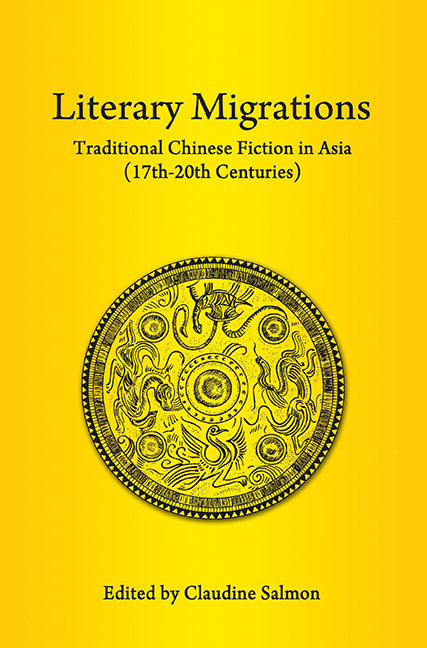Book contents
- Frontmatter
- Contents
- FOREWORD
- Dr Salmon as I Know her
- Preface to Reprint Edition
- Acknowledgements
- INTRODUCTION
- PART I KOREA AND JAPAN
- PART II MAINLAND NORTHEAST ASIA
- PART III MAINLAND SOUTHEAST ASIA
- PART IV INSULAR SOUTHEAST ASIA
- 10 A Note on Javanese Works Derived from Chinese Fiction
- 11 Malay Translations of Chinese Fiction in Indonesia
- 12 Writings in Romanized Malay by the Chinese of Malaya — A Preliminary Inquiry
- 13 Lie Sie Bin Yoe Tee Hoe — Six Malay/Indonesian Translations of a Chinese Tale
- 14 Liang Shanbo yu Zhu Yingtai — A Chinese Folk Romance in Java and Bali
- 15 Translations of Chinese Fiction into Makassarese
- 16 Sam Pek Eng Tay — A Chinese Love Story in Madurese
- 17 Post-war Kung Fu Novels in Indonesia — A Preliminary Survey
- Bibliography
- Author, story-teller and translator index
- Title index
- List of Plates
- Contributors
- Plate section
15 - Translations of Chinese Fiction into Makassarese
from PART IV - INSULAR SOUTHEAST ASIA
Published online by Cambridge University Press: 21 October 2015
- Frontmatter
- Contents
- FOREWORD
- Dr Salmon as I Know her
- Preface to Reprint Edition
- Acknowledgements
- INTRODUCTION
- PART I KOREA AND JAPAN
- PART II MAINLAND NORTHEAST ASIA
- PART III MAINLAND SOUTHEAST ASIA
- PART IV INSULAR SOUTHEAST ASIA
- 10 A Note on Javanese Works Derived from Chinese Fiction
- 11 Malay Translations of Chinese Fiction in Indonesia
- 12 Writings in Romanized Malay by the Chinese of Malaya — A Preliminary Inquiry
- 13 Lie Sie Bin Yoe Tee Hoe — Six Malay/Indonesian Translations of a Chinese Tale
- 14 Liang Shanbo yu Zhu Yingtai — A Chinese Folk Romance in Java and Bali
- 15 Translations of Chinese Fiction into Makassarese
- 16 Sam Pek Eng Tay — A Chinese Love Story in Madurese
- 17 Post-war Kung Fu Novels in Indonesia — A Preliminary Survey
- Bibliography
- Author, story-teller and translator index
- Title index
- List of Plates
- Contributors
- Plate section
Summary
In a previous article on the literary life of the Peranakan Chinese in Makassar, we offered a general outline of their contribution to the development of the local literature (especially in Makassarese) for 1930–50, a period which seems to be particularly rich. Here we will only focus on their translation activities.
Unlike Java where we have evidence of increasing interest among the Peranakan in their ancestral culture as early as the mid-nineteenth century, in Makassar we have not been able to trace translation of a Chinese work before the late 1920s. However, until recently the specialists in Makassarese and Buginese literature have ignored works derived from the Chinese. To the best of our knowledge no text emanating from China or a Chinese is listed in the extant catalogues of Makassarese and Buginese manuscripts. The first article to commemorate the contribution of the Chinese to Makassarese literature was written in 1956 by Yo Kao Tjio, himself a writer born in Makassar.
1. Historical Background
As a matter of fact the history of the Peranakan Chinese of Makassar does not differ very much from that of their counterparts in Java. They were placed under the supervision of a Chinese headman or Captain before the beginning of the eighteenth century. Until the end of the nineteenth century, very few Chinese women left their country and immigrants had to marry local women. The newcomers did not take readily to the local customs, and their wives consequently adopted Chinese ones, which was easier for them because descendants of Chinese often intermarried. The result was the development of a community straddling two cultures. For the end of the nineteenth century we have some information on a few wealthy families of long standing in Makassar like the Nios, the Thoengs, the Yos, the Lies and the Angs. These families produced the Chinese officers, who were appointed by the Dutch authorities.
As in Java, the last years of the nineteenth century were characterized by a revival of interest in Chinese culture in these Peranakan circles. Several big traders such as Wang Jue (born in Yongchun Fujian, in 1866), who settled in Makassar in 1886, played a significant part in the revival of Chinese education.
- Type
- Chapter
- Information
- Literary MigrationsTraditional Chinese Fiction in Asia (17th–20th Centuries), pp. 359 - 374Publisher: ISEAS–Yusof Ishak InstitutePrint publication year: 2013

